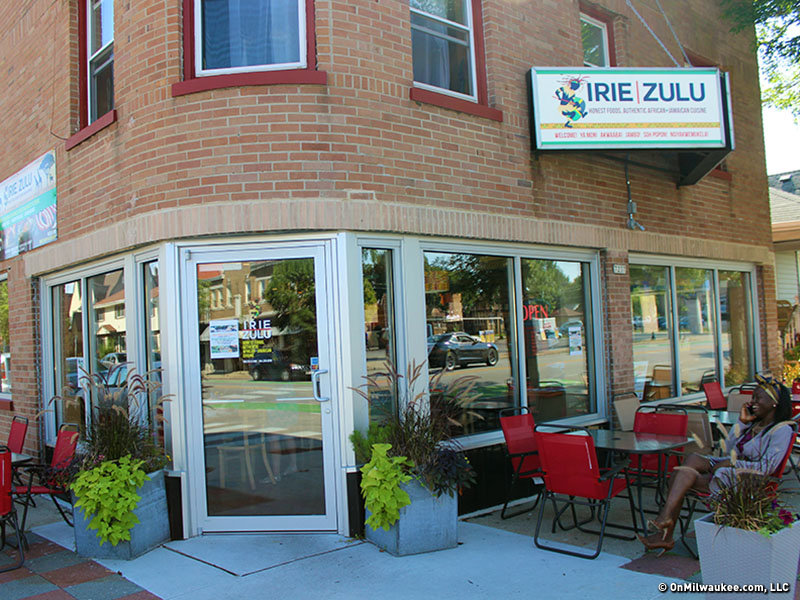What's in a restaurant? In this series, we ask chefs around the city to describe their restaurants in their own words and recommend three dishes that embody the best of what they offer. In this edition, we talk with Yollande Deacon of Irie Zulu in East Tosa.
Irie Zulu
7237 W. North Ave
(414) 326-9251
iriezulu.com
"Irie Zulu is a marriage," says Deacon. "It’s the cultures of both my husband Mexton and I knit together seamlessly (Africa and Jamaica). It’s an expression of our love for our respective cultures, for good well-sourced food and the magic of spending time with people you love. The first time we went on a date, he made Jamaican curry and I made Cameroonian domba; and as different as they were, there were also similarities. And we saw the ways that our cultures complemented one another."
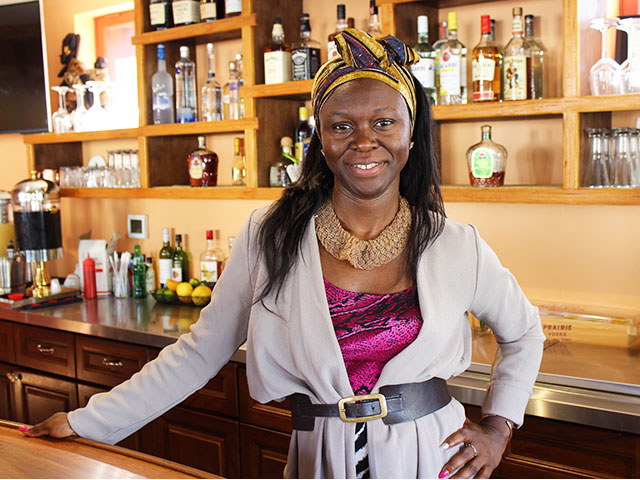
"Irie Zulu is also the canvas by which I express myself creatively; I channel what I want to share with people. When people come here, they should expect a continuously evolving menu that reflects what’s readily available and what we can make the best. Our food is created by people who are well versed in the culture, so we’re able to interpret these dishes in the best way possible. We concentrate our energy on re-creating the best of what is authentic and true to our experiences.
"The people who enjoy it here are those who are interested in an experience that includes learning from us as well as sharing with us what they know. It’s also for people who are into adventure, who celebrate local food and love to experience the diversity of cultures.
"The spirit of Irie Zulu comes down to a love for people, a love for food, a love for culture and a good time."
1. West African fish stew
Authentic Senegalese fonio or couscous, farm raise local fresh fish, seasonal organic vegetables ($24). Served with couscous.
"This is really a representation of the coastal zone of Cameroon. And I’ve found it’s also popular on the Ivory coast. It’s made traditionally with King Fish, so you get this romance between the sea and the vegetables and tomato sauce. It’s very traditional. We make it in a pot, but it can also be made steamed in banana leaves. The secret in the dish is the African nutmeg, which has a peppery flavor like Szechuan pepper along with the familiar flavor of nutmeg. It’s an ingredient that is used in almost all of our stews. In West Africa we eat it with couscous, rice, boiled ripe plantain or foofoo, a starchy mixture made with corn, taro, yucca, yam, green banana or plantains. Foofoo is also called paps (South Africa), shima (southern Africa) or banku (Ghana)."
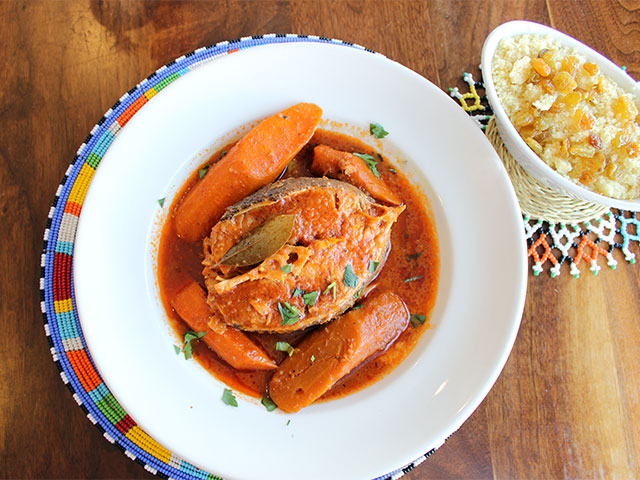
2. Vegan South African curry
Organic sauteed seasonal vegetables, chickpeas, potatoes, Cap Malay curry, plantain or rice ($17). Served with rice.
"Historically, cattle were very expensive in Africa. So, meats were usually only eaten for special occasions. So, this dish is a reflection of that, and what is eaten day to day. My friend Joelle has an uncle who lives in South Africa and he found us internships there after college; this is one of the first dishes I ate there. It was one of the first times I’d been away from home, and I recognized how different the flavors were from what I had at home. What makes the dish special are the spices; you can use almost any combination of seasonal vegetables. It’s an approachable, simple dish, but very hearty. And I can still remember the smile she had when she served it. I remember the love. And I thought, this is the perfect dish for my menu."
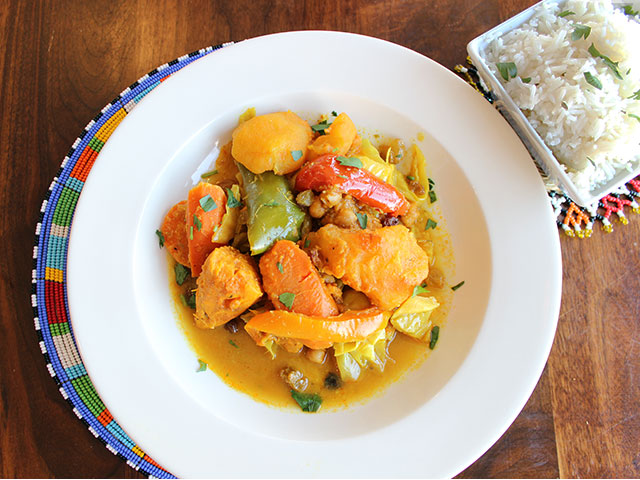
3. Cameroonian style curried goat (domba chevre)
Local sustainably raised bone-in goat, lemongrass, African basil, nutmeg Afro-Fusion Cuisine spices ($23). Served with rice or plantains.
"Domba is the dish of the queens. It’s not just a traditional dish. It’s a culture, a practice made into a dish. It’s cooked with goat when there are weddings, occasions or important events because when there is a special occasion, people give a goat as a gift. It’s a way of showing love, appreciation, to give people blessings. This is a dish that represents a way of life. Goats have great symbolism – they are gifts, and giving them is an act of love. In Cameroon, beef is not nearly as prized as goat. If you saw someone with a goat, you always knew something big was happening."
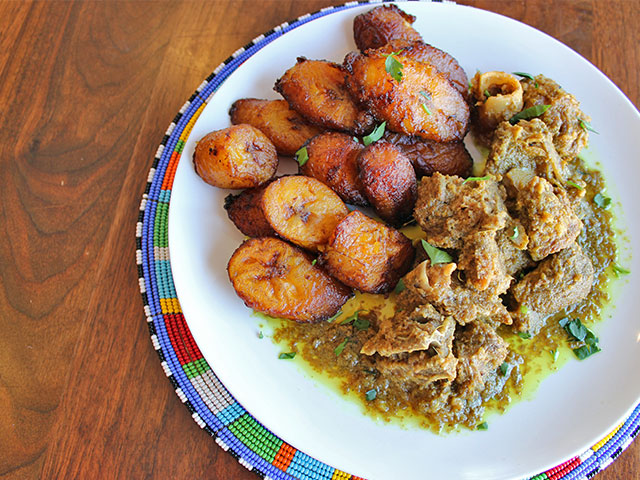
"From a cooking standpoint, this is one of the most complex dishes on the menu right now. The goat must be steamed, roasted and then set aside. The sauce needs to be prepared and set aside for 24 hours. And then you put everything together and allow the flavors to meet each other. It also contains the heavy hitters in African cooking: African nutmeg, Cameroonian pepper and alligator pepper. All three are essential in West African cooking."
Irie Zulu is open Tuesday through Thursday from 3 to 9 p.m. (menu features flavors of Africa); Friday 3 to 10 p.m. (menu focuses on dishes of Jamaica) Saturday 3 to 10 p.m. (menu includes best of Jamaica and Africa).
As a passionate champion of the local dining scene, Lori has reimagined the restaurant critic's role into that of a trusted dining concierge, guiding food lovers to delightful culinary discoveries and memorable experiences.
Lori is an avid cook whose accrual of condiments and spices is rivaled only by her cookbook collection. Her passion for the culinary industry was birthed while balancing A&W root beer mugs as a teenage carhop, fed by insatiable curiosity and fueled by the people whose stories entwine with every dish. Lori is the author of two books: the "Wisconsin Field to Fork" cookbook and "Milwaukee Food". Her work has garnered journalism awards from entities including the Milwaukee Press Club. In 2024, Lori was honored with a "Top 20 Women in Hospitality to Watch" award by the Wisconsin Restaurant Association.
When she’s not eating, photographing food, writing or planning for TV and radio spots, you’ll find Lori seeking out adventures with her husband Paul, traveling, cooking, reading, learning, snuggling with her cats and looking for ways to make a difference.

